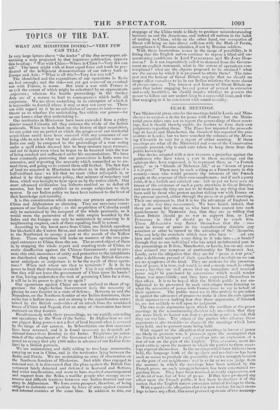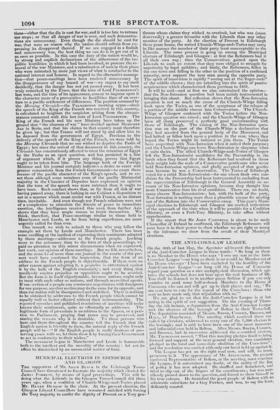PEACE MEETINGS.
THE Ministerial press attacks the meetings held in Leeds and Man- chester to express a desire for peace with France : but the Minis- terial press takes care not to report the proceedings of those meet-
ings, lest it should thereby enable its readers to form their own judgments regarding them. The Times has reported the proceed- ings at Leeds and Manchester, the .S.tontlard has reported the pro- cedings at Leeds; but We have searched the columns of the Morn- ing Chronicle in vain for a report of either meeting. If these
meetings are what all the 3Iinisterial and some of the Conservative journals pretend, why is such care taken to keep them from the public knowledge ?
One device adopted with a view to create a prejudice against the gentlemen who have taken a part in these meetings and the opinions they have expressed, is to represent them as " a French
party," or as " friends of Mehemet Ali," or as "lovers of peace a teat prix." There may be such a thing as a French party in this
country—men who would promote the interests of the Emrich people at the expense of their own countrymen ; and if such a party exist, it is a foolish and criminal one : but as yet we have seen no
traces of the existence of such a party anywhere in Great Britain; and most assuredly they are not to be found in any thing that has been said by those who protest against risking war with France on the present quarrel, either through the press or at public meetings. Their one argument is, that it is for the advantage of England to act in the way they recommend. We have heard, indeed, that there are some few among us who have been coaxed into such good-humour by MEHEMET ALI, that they are as willing that Great Britain should go to war to support him, as Lord PONSONEY is that it should go to war to crush him. These Miliciactites may flatter themselves that the :.. aye- ment in fitvour of peace in the manufacturing districts may somehow or other be turned to the advantage of thei:. ',favourite. Who can help the crotchets which men who have a- ' :ed one idea and would sacrifice every thing to it take into L.leir heads? Enough that no one individual who has acted an influential part in the proceedings at Bolton, Manchester, or Leeds, has on any occa- sion evinced any symptom of partisanship for MEHEMET Au. Lastly, as to the allegation that they are for " peace d find prix," after a deliberate perusal of their speeches and resolutions we can see no symptoms of the kind. They are anxious for the preserva- tion of peace, it is true, and would do and concede much to obtain peave ; but they are well aware that an immediate and nominal peace mh.t be purchased by concessions which would render future war unavoidable ; and they have expressed themselves to that effect. It is to be hoped that the British public is too en- lightened to be prevented by such subterfuges from listening to what the advocates of peace with France have to say in behalf of their opinions. The public must see in this anxiety to prejudice it against the advocates of peace—to make it close its ears against their argumerts—a lurking fear that these arguments, if listened to, are not unlikely to tell upon its judgment.
The two main arguments upon which the cavillers at the peace meetings in the manufacturing districts rely arc—first, that they are more likely to hasten war than to promote peace second, that they are too late. The object of the parties who advance these arguments is also twofold—to diseret:it the meetings which have been held, and to prevent more being held.
With regard to the allegation that meetings in favour of peace are likely to promote war, it proceeds upon the assumption that the French will interpret such meetings into an expression of a fear of war on the part of the English. This, oreourse, must de- pend entirely upon the manner in \\ hieli the parties to these meet- ings express thetnselves. In the meetings which have hitherto been held, the language both of the speakers and resolutions has been such as seems to preclude the possibility of such a misapprehension on the part of our neighbours : an■I in so ffir as we cm judge from the manner in which the meetings have been noticed by the French press, no such misapprehension has been entertained re- garding them. They have been received as manly expressions, not of dread of war, but of love of peace. It' they ha e produced any effect upon the French public, it has been to disabuse it of the notion that the English nation entertains inimical feelings to them.
With regard to the allegation that it is now too late for such meet. ings to have any effect, this must proceed upon one of two as,sump. tions—either that the die is cast for war, and it is too late to retrace our steps ; or that all danger of war is over, and such demonstra- tions are unnecessasy. Even though the die should be cast for war, that were no reason why the nation should refrain from ex- pressing its disapproval thereof. If we are engaged in a foolish and unnecessary war, the best thing we can do is to get out of it as soon as possible. In this case the duty of the nation would be, by strong and explicit declarations of the abhorrence of the im- politic hostilities in which it had been involved, to procure the re- moval of the war Ministers, and a substitution of men in their place who were animated by more just views of what is conducive to the national interest and honour. In regard to the alternative assump- tion—that peace-meetings have been rendered unnecessary by the disappearance of any hazard of war—we regret to say most decidedly, that the danger has not yet passed away. It has been
truly remarked by the Times, that the tone of Lord PALMERSTON'S last note, and the time of its appearance, concur to impress upon it
the character more of a provocative to hostilities than of an over-
ture to a pacific settlement of differences. The position assumed by the Morning Chronicle—the PALM ERSTON morning organ—since
the speech of the King of the French was received in this country,
is calculated to heighten the suspicion arising from the circum- stances connected with this last note of Lord PALMERSTON. The King of the French and his new Ministry have taken up the ground that "the chances of war" have decided against MEHEMET Am in Syria, and that his claims to that country must therefore be given up ; but that France will not stand by and allow him to be deposed from the government of Egypt. Previous to the delivery of the speech of the King of the French, we were told by the Morning Chronicle that no one wished to deprive the Pasha of Egypt ; but since the arrival of that document in this country, the Chronicle has ostentatiously affected to treat the retention of Egypt by the Pasha as an open question, and has persisted in a line of argument which, if it proves any thing, proves that Egypt ought to be taken from him. The language both of the Foreign Minister and his journal certainly indicates a desire to exact still greater concessions from the French Government—to exact them because of the pacific character of the King's speech, and to ex- act them although some members even of the pacific Ministerial majority in the Chamber of Deputies have expressed an opinion that the tone of the speech was more subdued than it ought to have been. Such conduct shows that, so far from all risk of war having passed away, there is lurking in our Cabinet a disposition to act in a manner which must render war with France, at no distant time, inevitable. And even though our French relations were not of a complexion to stimulate the friends of peace to immediate exertion, the intelligence received this week from further Asia shows that they have ample reason to bestir themselves. We think, therefore, that Peace-meetings similar to those held in Manchester and Leeds, so far from being superfluous, are more urgently called for than ever. One remark we wish to submit to those who may follow the example set them by Leeds and Manchester. There has been some cavilling at the method of expressing their sentiments adopted by those meetings—addresses to the French people. Looking more to the substance than to the form of their proceedings, we paid no attention to this minor circumstance when we expressed, last week, our opinion of those meetings. But we felt, nevertheless, and the mum ks of more than one journal in the course of the pre- sent week have confirmed the impression, that the form of an address to the French people is objectionable. If there were no other reason against adopting it, a prtjudice is entertained against it by the bulk of the English community ; and every thing that needlessly excites prejudice or opposition ought to he avoided. But the form is in itself objectionable, because nations ought only to treat with each other as nations, and through accredited agents. If one section of a people can commence negotiations with foreigners for one purpose, another section may do the same for its opposite, and thus the nation will be disorganized and stultified. There is nothing to be obtained by addresses to the French people which cannot be equally well or better effected without their instrumentality. The reported speeches and published resolutions of' meetings will make known their sentiments, quite as effectually as addresses. The legitimate form of procedure is an address to the Queen, or a peti- tion. to Parliament, praying that peace may be preserved, and stating the reasons why it is desirable. To those persons who here and there throughout the country tell the French that the English nation is friendly to them, the natural reply of' the French people will be—" If' the English people is really desirous of' pre- serving peace with us, let them show it by forcing their Government to act in conformity to their wishes."
The movement begun in Manchester and Leeds is both to the intellect and the morality of the country : effect be diminished by an unessential matter of form. honourable let not its



























 Previous page
Previous page